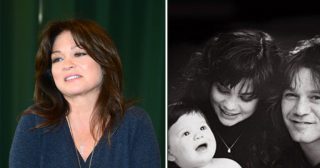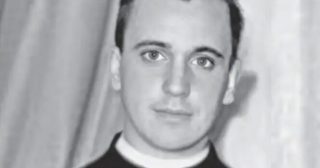Patricia Rashbrook: The Controversial Story of Britain’s Oldest Mom

In 2006, the world was stunned when Patricia Rashbrook, a 62-year-old child psychologist from the UK, gave birth to a healthy baby boy. This groundbreaking event made her the oldest woman in the country to have a child, sparking both admiration and fierce debate.
Was her decision a triumph of medical science or a reckless gamble? Critics were quick to voice their disapproval, while others celebrated her defiance of age as a bold step in modern parenthood.
But the story didn't end there — an unexpected and heartbreaking update has recently surfaced, shedding light on Patricia’s life today.
The Startling Revelation: A Mother at 62
In July 2006, Patricia Rashbrook made headlines worldwide. As a respected child psychologist, Patricia had already raised three grown children from a previous marriage. But her new journey into motherhood, with her second husband John Farrant, defied convention. At 62, she welcomed a son, Jude, after undergoing IVF treatments abroad.

This moment was not just a personal victory, but a media frenzy. The image of a grandmotherly woman cradling a newborn was both heartwarming and perplexing.
But this wasn’t simply a story of late-life motherhood. It raised questions that continue to stir controversy: Was it a medical marvel or a dangerous choice?
A Journey of Determination and Love
Patricia and John’s longing for a child together led them to defy the odds. While traditional fertility clinics in the UK rejected Patricia due to her age, the couple sought the expertise of Professor Severino Antinori, an Italian fertility doctor known for assisting women past menopause. After multiple failed attempts in Italy, the couple traveled to Russia, where Patricia finally succeeded using a donor egg.
Their perseverance paid off. On July 5, 2006, Patricia gave birth to a healthy boy via C-section. As they welcomed Jude, the couple played Elgar’s Salut d’Amour, the same music that had played at their wedding.
“We would never have gone ahead with this if we didn’t believe we could be good parents,” Patricia said, emphasizing her belief in their ability to provide for their child.
The Backlash: Was It Irresponsible?
While stories of late motherhood are more common today, Patricia’s decision to become a mother at 62 was met with intense backlash in 2006. Critics called her decision selfish and questioned her ability to care for a child at such an advanced age. Some argued that, as a child psychologist, Patricia should have known better.
One columnist in The Sun referred to the event as a "sickening" example of selfishness. Meanwhile, Karren Brady compared Patricia to aging rockstars who father children late in life, noting that society doesn’t hold women to the same standard.
Even Patricia’s own cousin expressed concern: "I look after my grandchildren, and after 10 minutes, I’m exhausted. I don’t know how she’ll manage with a newborn."
But amidst the criticism, some voices defended her right to choose. AN Wilson in the Evening Standard challenged the outrage, pointing out that women in their 60s are often fit and healthy enough to care for children.
A Family Built on Love
For Patricia and John, the decision to have a child wasn’t about breaking records or making headlines. It was about love and fulfilling a shared dream of parenthood.
John, who had never had children before, found that fatherhood transformed him. "I always wanted to be a father, but I never had the opportunity," he said, emotionally recalling how Patricia helped him realize this dream.
Years later, in 2007, Patricia was seen walking through the streets of Lewes, East Sussex, with her growing son, Jude. The sight of a 64-year-old mother caring for her toddler sparked even more debate, but Patricia remained unfazed.
Patricia’s Response: A Mother's Assurance
Patricia was well aware of the concerns over her age, but she reassured the public that their son would be well cared for. "We are both in good health, and we have younger friends who have agreed to act as surrogate parents if anything happens to us," she explained.
Despite the public scrutiny, Patricia remained confident in her ability to be a loving mother. She emphasized that her decision was carefully planned, and she had made provisions for her child’s future.
Her grown children from her first marriage were supportive, and their home was filled with the sound of laughter from young Jude, who had become the center of their lives.
A Heartbreaking Update: Patricia’s Life Today
It's now 19 years since Patricia made headlines around the world. Jude has grown into a young man, and the family has remained out of the public eye. Sadly, in 2021, John Farrant passed away, leaving behind a legacy of love and commitment to his family and his community.
Friend and colleague Christopher Whittick fondly remembered John’s work as a local historian and praised the joy fatherhood brought him.
Patricia, now 76, is no longer in the public spotlight, but her story remains one of the most controversial and captivating tales in modern fertility history.
The Legacy of Patricia Rashbrook: A Mother Against the Odds
Patricia Rashbrook’s story raises important questions: Was she a trailblazer, proving that age is no barrier to parenthood, or did she cross an ethical line that should never have been crossed?
Whatever your opinion, Patricia’s journey serves as a powerful reminder of the personal and societal challenges that come with modern fertility treatments. Share your thoughts in the comments below.
Conclusion: The Evolution of Fertility and Motherhood
Patricia’s story is just one of many that highlight the complexities of fertility and the evolving age limits of motherhood. With more women choosing to have children later in life, technological advancements in fertility continue to shape how we view family planning and age.

If you found this story inspiring or controversial, don’t forget to share it! And be sure to check out related articles on the topic of fertility treatments and late-life motherhood.
Call to Action:
Have you ever wondered about the ethics of late-life parenthood? Join the conversation in the comments!
Want to know more about fertility treatments and age? Explore our in-depth guides and stay informed.










